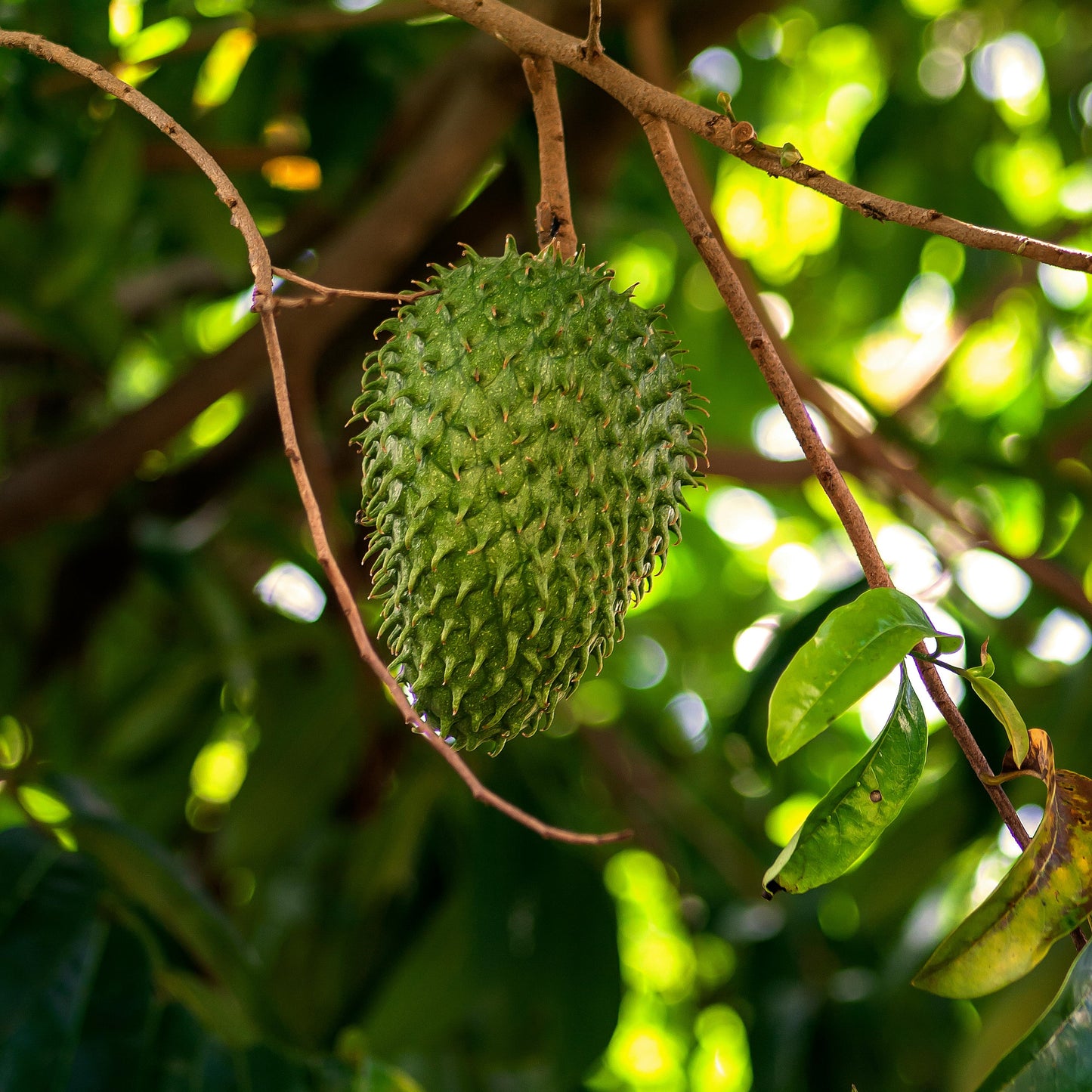Spring Sale
Enjoy 10% OFF on all your favorite products! Use code SPRING at checkout. Hurry, limited time only! 🌿✨ #SpringSavings
This store requires javascript to be enabled for some features to work correctly.

In the realm of natural health remedies, soursop leaves have been gaining attention for their potential immune-boosting properties. Soursop, scientifically known as Annona muricata, is a tropical fruit tree native to the Caribbean and parts of South and Central America.
While the fruit itself is prized for its unique flavor and nutritional value, the leaves of the soursop tree have been used in traditional medicine for centuries. This blog post will explore the potential immune-boosting benefits of soursop leaves, their traditional uses, and the scientific research supporting their health claims.
Before delving into the immune-boosting properties of soursop leaves, it's essential to understand the plant itself:
Botanical description: Soursop is an evergreen tree that can grow up to 30 feet tall. It produces large, heart-shaped fruits with a spiny exterior and creamy white flesh.
Distribution: Native to the tropical regions of the Americas, soursop is now cultivated in many tropical and subtropical areas worldwide.
Traditional uses: Various parts of the soursop tree, including the leaves, bark, and fruit, have been used in traditional medicine to treat a wide range of ailments.
Soursop leaves contain a variety of compounds that contribute to their potential health benefits:
Antioxidants: Rich in flavonoids, phenols, and other antioxidant compounds
Vitamins: Contains vitamin C, vitamin B1 (thiamine), and vitamin B2 (riboflavin)
Minerals: Includes calcium, magnesium, potassium, and iron
Phytochemicals: Contains acetogenins, alkaloids, and quinolines
The immune-boosting potential of soursop leaves is attributed to several factors:
In various cultures, soursop leaves have been used traditionally to support immune health:
Tea preparation: Soursop leaf tea is a common traditional remedy for boosting overall health and immunity.
Poultices: Crushed leaves have been applied topically to address skin infections and wounds.
Decoctions: Boiled leaf preparations have been used to treat various ailments believed to be related to immune function.
While traditional use is widespread, scientific research on soursop leaves is still in its early stages:
In vitro studies: Laboratory studies have demonstrated potential antimicrobial and antioxidant activities of soursop leaf extracts.
Animal studies: Some animal studies have shown promising results regarding the immunomodulatory effects of soursop leaf extracts.
Human studies: Limited human studies have been conducted, and more research is needed to confirm the immune-boosting effects in humans.
If you're interested in exploring the potential benefits of soursop leaves, consider these methods:
Steep 2-3 dried soursop leaves in hot water for 5-10 minutes.
Strain and drink as a tea, typically consumed 1-2 times daily.
Available in capsule or powder form, follow the manufacturer's recommended dosage.
Some people use soursop leaf poultices or ointments for skin-related immune support.
While soursop leaves are generally considered safe when used in moderation, it's important to be aware of potential risks:
Pregnancy and breastfeeding: There's insufficient evidence regarding safety, so it's best to avoid use during these periods.
Drug interactions: Soursop may interact with certain medications, including those for high blood pressure and diabetes.
Neurotoxicity concerns: Long-term, high-dose consumption of soursop products has been associated with neurotoxic effects in some studies.
Quality and contamination: Ensure you source soursop leaves from reputable suppliers to avoid potential contamination issues.
While this post focuses on immune-boosting properties, soursop leaves have been studied for various other potential health benefits:
Anticancer properties: Some studies suggest potential anticancer effects, though more research is needed.
Blood sugar regulation: Preliminary research indicates possible benefits for managing blood sugar levels.
Pain relief: Traditional use includes pain management applications.
Digestive health: Some cultures use soursop leaves to address digestive issues.
Conclusion:
Soursop leaves offer intriguing potential as a natural immune-boosting remedy. Rich in antioxidants and bioactive compounds, they have been used traditionally for centuries to support overall health and immunity. While scientific research is still in its early stages, the preliminary findings are promising. However, it's crucial to approach the use of soursop leaves with caution and awareness of potential risks and interactions.
As with any natural remedy, it's essential to consult with a healthcare professional before incorporating soursop leaves into your health regimen, especially if you have existing health conditions or are taking medications. While soursop leaves may offer potential immune-boosting benefits, they should be considered as part of a holistic approach to health that includes a balanced diet, regular exercise, adequate sleep, and stress management.
As research continues to evolve, we may gain a deeper understanding of the full potential of soursop leaves in supporting immune health. Until then, those interested in exploring this natural remedy should do so responsibly and with informed caution.
Discover the art of brewing the perfect Chamomile-Peppermint Herbal Infusion—a soothing blend that calms the senses and refreshes the mind. This simple recipe combines dried chamomile flowers and peppermint leaves, steeped at just the right temperature to unlock their full flavor. Add honey and lemon for extra zest and enjoy a truly relaxing tea experience!
Detoxification plays a key role in maintaining hormonal balance by eliminating toxins that disrupt the endocrine system. Herbs like dandelion root, milk thistle, turmeric, and ashwagandha support liver function, reduce inflammation, and help regulate hormone levels naturally. Along with a clean diet, hydration, exercise, and stress management, incorporating detox herbs through teas, supplements, and infusions can enhance overall well-being. A consistent, holistic approach is essential for lasting hormonal harmony and optimal health.
Experience the magic of hibiscus tea in baking with these three irresistible cake recipes. Whether it's a buttery pound cake, a citrusy layer cake, or a rich chocolate treat, each dessert perfectly balances floral elegance and tangy sweetness. Perfect for tea parties, gatherings, or a special treat!